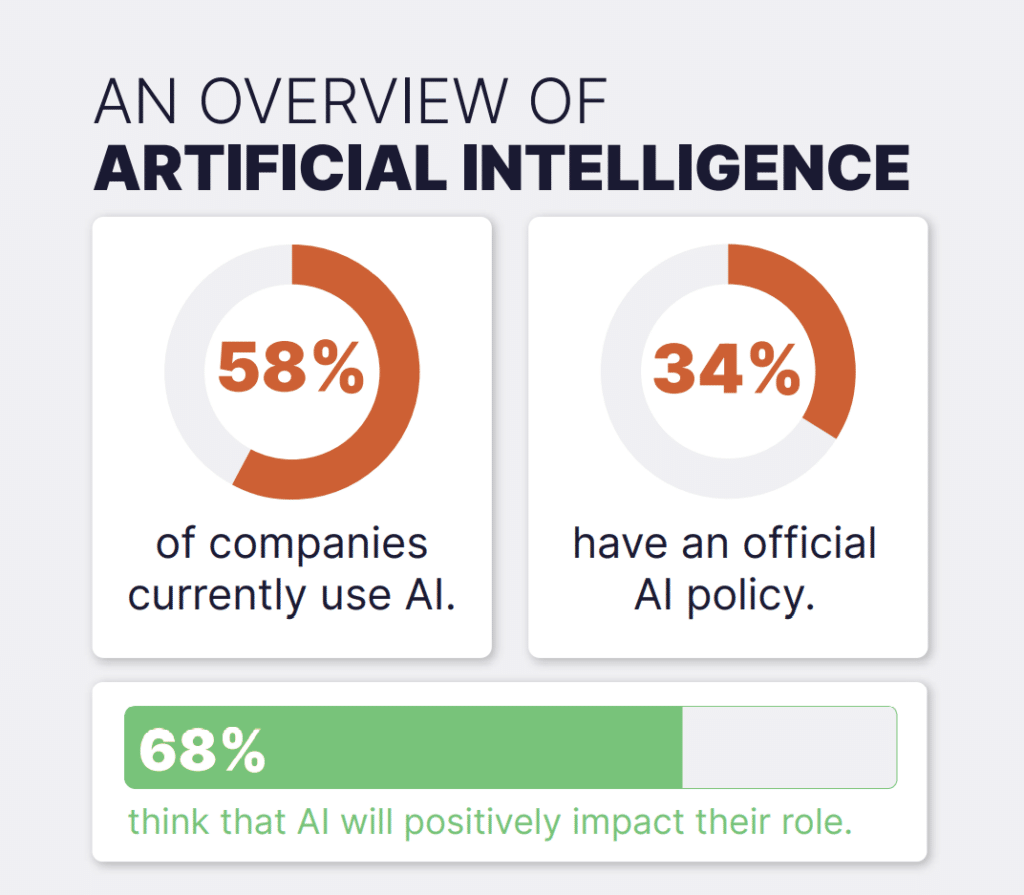Harnham’s 2024 UK Data & AI Salary Guide is now live!
Featuring the latest salary data in the space, as well as hiring trends shaping the market and exclusive commentary from industry experts, our comprehensive research stands as an invaluable resource for employees looking to better understand their worth and position in the market, as well as employers looking to level up their hiring strategy.
In our 13th annual Data & AI Salary Guide, which incorporates 180,000 data points from over 3,500 data and AI professionals globally, we take a closer look at what’s happened in the world of tech over the last 12 months.
Job security dips in wake of widespread tech layoffs
One of the key takeaways from this year’s guide is that job security in the space is at a four-year low. While the majority (60%) of respondents feel as or more secure in their roles than 2023, this figure has significantly dropped post-Covid. The research also found that just 59% would leave their role if the right opportunity came up; the lowest this figure has been in four years – falling from 74% in 2020.
Salary dissatisfaction remains the top reason for our respondents leaving their role in the last 12 months, with a lack of career progression coming in second. Amid turbulent market conditions and the notorious tech layoffs, however, company downsizing and redundancies have entered the top five reasons for the first time.
“It’s clear that instability in the market is causing data professionals to be more cautious,” says David Farmer, CEO of Harnham. “However, there needs to be a level of fluidity in the market to keep ideas fresh and to ensure that those in the industry are reaching their full potential. Unfortunately, if employee mobility is limited, innovation could also stagnate.”
Two-thirds of companies don’t have an AI policy
AI remains an unavoidable talking point in the world of data. Recent global projections predict that artificial intelligence will contribute over $15.7 trillion to the global economy by 2030, and is estimated to created 133 million new jobs.

[Source: Harnham]
“We’re currently seeing candidates leaning towards the consulting route, advisory route, or even starting their own AI start-up rather than taking a pay cut to join another company during these times. As for the job market, we still notice most of our hiring managers looking for end-to-end machine learning engineers with a strong coding and engineering background.
“It’s been a while since we have seen a genuine uptick on research data science roles.”
Looking ahead, 39% of respondents expect LLMs/Generative AI rollout in organisations to have the biggest impact on data and AI this year, followed by data management (16%) and human AI partnership (15%).
Data governance professionals saw biggest pay change
Reflecting our talent solutions, our guide covers the full data lifecycle from collection to consumption. Some interesting trends can be drawn between specific markets.
Data engineering professionals, for example, felt most secure in their role than the year before (63%). Advanced Analytics, Marketing & Insight professionals were the least secure. Meanwhile, data governance and data management professionals reported having the largest change in pay in 2024 (62%) and software engineering had the smallest change in pay (37%).
On the diversity front, the representation of female professionals in the space has stayed largely the same, with 31% of our respondents identifying as female. Digital analytics had the highest percentage of women in the workforce (42%), while software engineering had the lowest (17%).
—
Download Harnham’s 2024 UK Data & AI Salary Guide
We also offer custom salary benchmarking reports – a personalised overview of salary ranges, industry insights, and emerging trends for up to three specific positions of your company’s choice. Request a custom salary benchmarking report today.

























